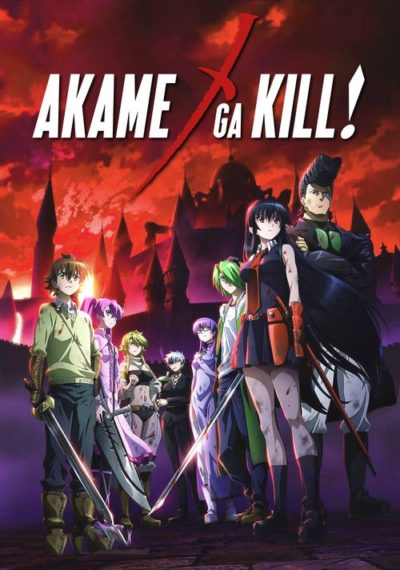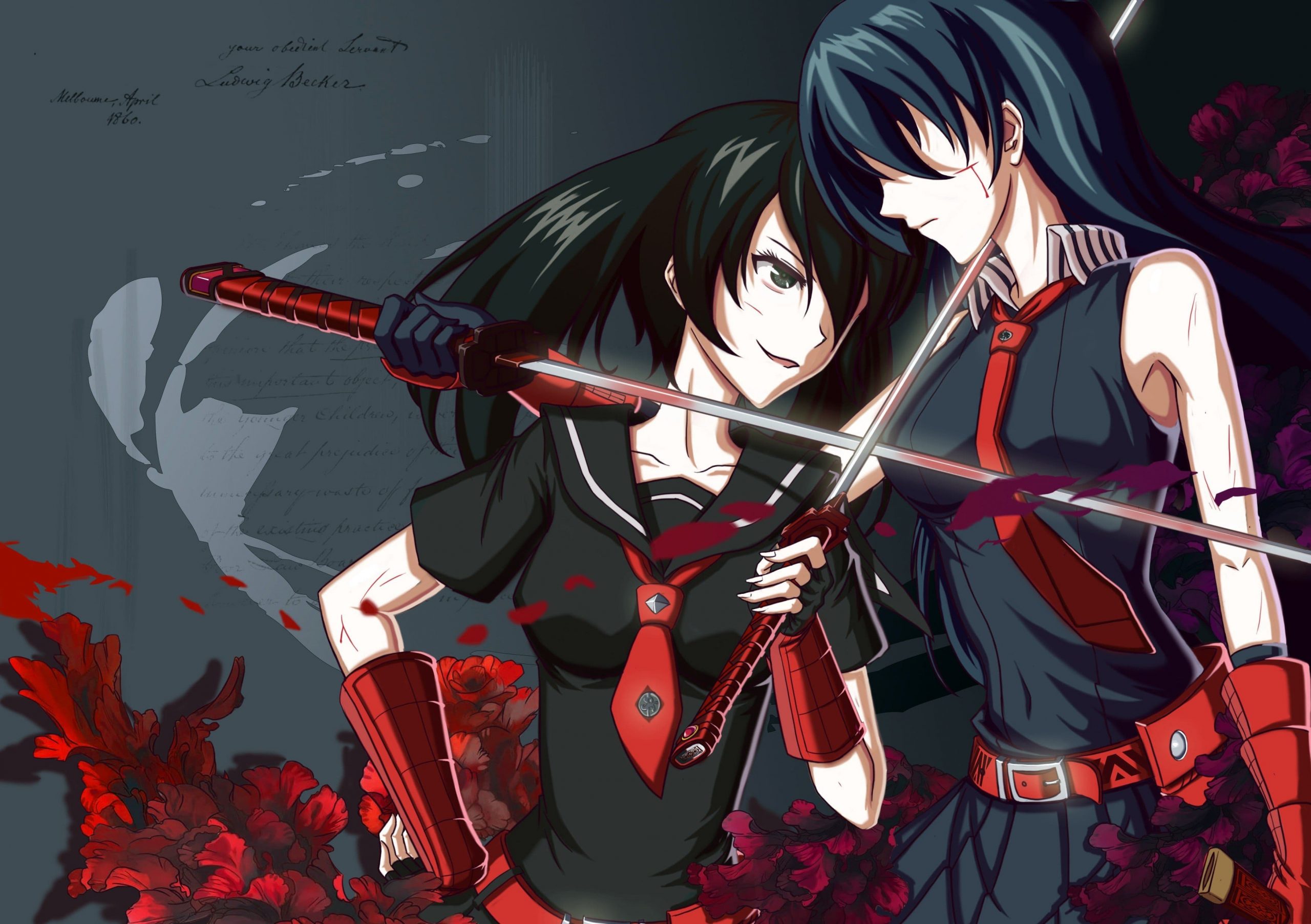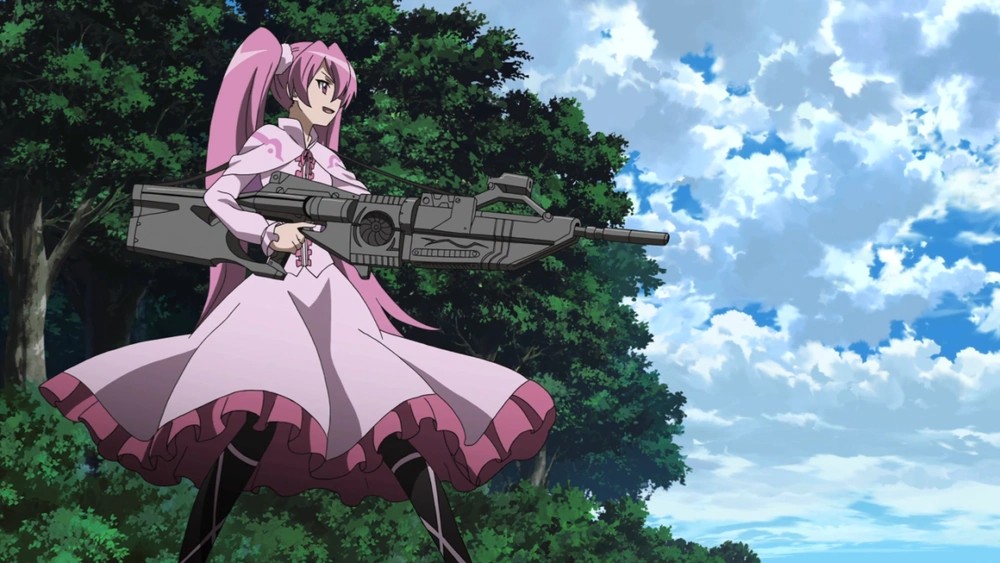★★★
“Game of Thrones meets Japanese anime humour”
 “Akame ga kill” can be translated as “Akame kills by slashing” and yes, she and her comrades do that and much more! Though, strangely enough Akame is not really the main character of the series, but young teen boy Tatsumi. Honestly, I wonder why the title character is not at the center of a show. But who cares as long as the show is good? And there is certainly no shortage of action heroines to be found therein.
“Akame ga kill” can be translated as “Akame kills by slashing” and yes, she and her comrades do that and much more! Though, strangely enough Akame is not really the main character of the series, but young teen boy Tatsumi. Honestly, I wonder why the title character is not at the center of a show. But who cares as long as the show is good? And there is certainly no shortage of action heroines to be found therein.
Let’s start with the plot of this fantasy anime series from 2014. Young Tatsumi (Saitô) comes into the capital of the Empire. Hoping to work his way up the ranks in the army, and send earnings back to his poor village, he’s quickly disillusioned when he’s tricked out of his money. A wealthy girl and her family offers him shelter, but in the night the infamous rebel group “Night Raid” attacks and kills all of the inhabitants of the house. They give Tatsumi a choice: join them, or die! Tatsumi is hesitant, until they show him that the two friends with whom he started out from his village, were tortured and slain by rich perverts for pleasure.
The truth of the country is then revealed. The young king is manipulated by an evil advisor, and the government is corrupt and consists of a rich elite who exploit the poor by taxes or by torturing them. Night Raid is a group of people, mostly unknown to the authorities, who want to overthrow the government. The advantage the group have is possession of so-called “Imperial Arms”, magical weapons that can do wonders. Each has its own special ability, and can typically be used only by a carrier to whom it responds emotionally. Unfortunately, their opponents also have these kind of weaponry. They are a newly formed group of the Empire called the “Jaegers” (“Jäger” is the German word for “hunter(s)”), under the leadership of the gruesome General Esdeath.
Let battle commence! For Akame ga kill is essentially a Battle Royale-esque anime version of Game of Thrones – though with every one of the main characters carrying Imperial Arms, all parties have an equal chance. And in common with Thrones, there are a lot of strong female characters on both sides, to the extent that they largely overshadow the male characters.
On the side of the rebels, you’ll find the thief Leone (Asakawa) who can turn into a feline beast with incredible regeneration abilities; the pink-haired Mine who wields a very big gun, triggered by the power of her own emotions; the socially awkward Sheele who uses giant scissors (it’s not as ridiculous as it sounds); and a restrained assassin, the title-giving Akame (Amamiya), as well as two male characters. All of them guided by Najenda, a former general of the empire, with a mechanical arm and an eye patch. Later on, they are joined by Chelsea, a saucy girl who is able to turn into anyone from a little cat to a two-metre man thanks to her magical make-up. Don’t ask, just go with it…
The other side responds, among the male characters, with fanatic guard Seryu Ubiquitous, who plays judge and hang(wo)man in one, and is probably the least likable character of the show. She owns a little magical dog that can become a giant beast, eat opponents and turn her body members into weapons. Then there’s Kurome, the little sister of Akame, who can command up to six dead people to do her bidding. And all of them are led by the sadistic General Esdeath. Imagine Elsa from Frozen having grown up to become a Nazi with very big… ahem… eyes… In the last quarter, also introduced are the so-called Rakshasa demons who have no magical weapons, but are specially trained assassins, although they don’t get any backstory.
There are a lot of fights between the characters on these two sides. The series follows the GoT model of killing off main characters one by one, be they good or bad; you start wondering if any one will still be alive for the final fights. But rest assured, there will be some, Surprisingly – attention: spoiler – Tatsumi is not the big winner in the end, despite being the center of the story. Obviously the writers of the show eventually remembered that the show’s title had Akame in it, so the big final duel is fought between Akame and General Esdeath.
Though… young Tatsumi is really favoured by the ladies, it has to be said: While feline Leone hardly made any effort to conceal that she had the hots for him, also Mine fell in love with him, clumsy Sheele connected with him, Akame seems to be touched by him, Najenda liked him and even the otherwise cold-hearted General Esdeath decided, after just having a glimpse, that she was in love with him. Cut to her half-naked with him in her bedroom!
The big problem I have with this series is that it is morally very dubious. Both sides kill with a similar lack of mercy, and don’t really care if you are just a normal guy without their powers. If you are on the wrong side, you basically deserve to die. It reminds me of something my chemistry teacher once jokingly said: “I cannot see any difference between right- and left-wing radicals because they don’t show any difference in the way they react!” [Jim: Ah, GirlsWithGuns.org. Come for the girls with guns, stay for the chemistry jokes!]
In my judgement, “Night Raid” don’t come off as better than the “Jaegers”. Everyone seems just too eager to kill the other side. Even sisters Akame and Kurome think it’s necessary to kill the other despite their family love. General Esdeath commands their squad, if they should come across Tatsume, to capture him alive – as long as it is possible, because the mission comes first. Their motivations – justice (or what Seryu thinks justice is), revenge, loyalty to the empire – may differ but their methods do not. And I have to say, I couldn’t avoid the impression that the series enjoyed showing the graphic violence happening to all the characters, a little bit too much.
 Honestly, I do have a big problem identifying with any of the dramatis personae. Their morality is up for grabs; even Tatsumi is too ready to kill those he doesn’t know to “free the people”. Actually, I don’t see the average Joe or Jane suffering very much from the “evil” regime. The normal people in the cities or at the market seem mainly to go about their business; I don’t hear them complaining about supression or the excessive taxes.
Honestly, I do have a big problem identifying with any of the dramatis personae. Their morality is up for grabs; even Tatsumi is too ready to kill those he doesn’t know to “free the people”. Actually, I don’t see the average Joe or Jane suffering very much from the “evil” regime. The normal people in the cities or at the market seem mainly to go about their business; I don’t hear them complaining about supression or the excessive taxes.
In the end, I was left with the impression we witnessed a feud between two powerful groups. who just fight for power. Equally distracting, the “evil guys” are depicted with some sympathy; in Wave, the Jaegers have a character that’s essentially their Tatsumi. Good or bad, the survivors always mourn the friends and comrades they lose in battle, and some on the “wrong” side even survive to build a better world. I guess my issue is, none of the characters ever question what they are doing. Yes, they may regret losing people and admit that they are killers. But they always seem to think that the purpose justifies the means – an attitude with which I have a basic philosophical problem.
Also, the combination of Game of Thrones grimdark and goriness with awkward Japanese anime humour does not really go well together IMHO. It’s really up to you if you can live with quirky character behaviour, in the midst of a dark and serious fantasy setting. The ending must rank among the most down-beat endings of any anime series. The reason may be due to another parallel with Game of Thrones: the studio ran out of the manga to turn into anime episodes, and had to invent its own ending.
So, a fan of the story can decide between two different ones. Spoilers. The manga eventually had Tatsumi marrying Mine with whom he was – to quote Shakespeare – in “a merry war” and had two babies with her. The anime ends with him dying in battle, in the arms of Akame. She fights Esdeath, who then encloses herself, to die with her beloved Tatsumi in an ice block that she shatters. The choice is yours. But after the final end title, is a little postscript to shows Akame will continue her assassin work among the lawless, quite probably the last survivor of “Night Raid” and this story.
Dir: Tomoki Kobayashi
Star (voice): Sora Amamiya. Sôma Saitô, Yu Asakawa, Risa Mizuno





